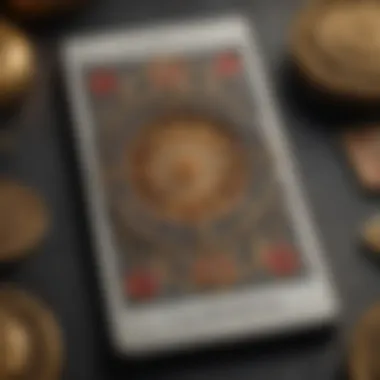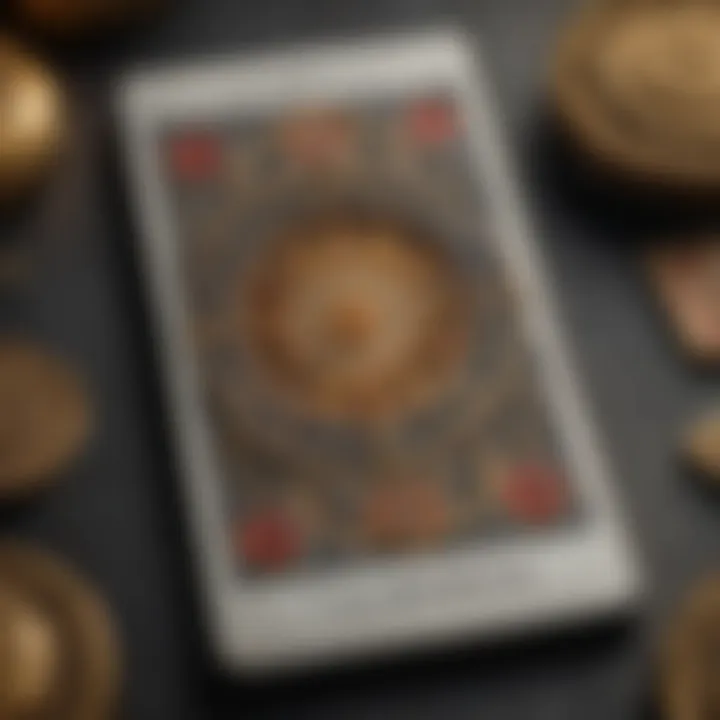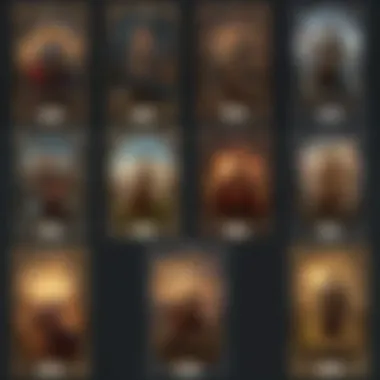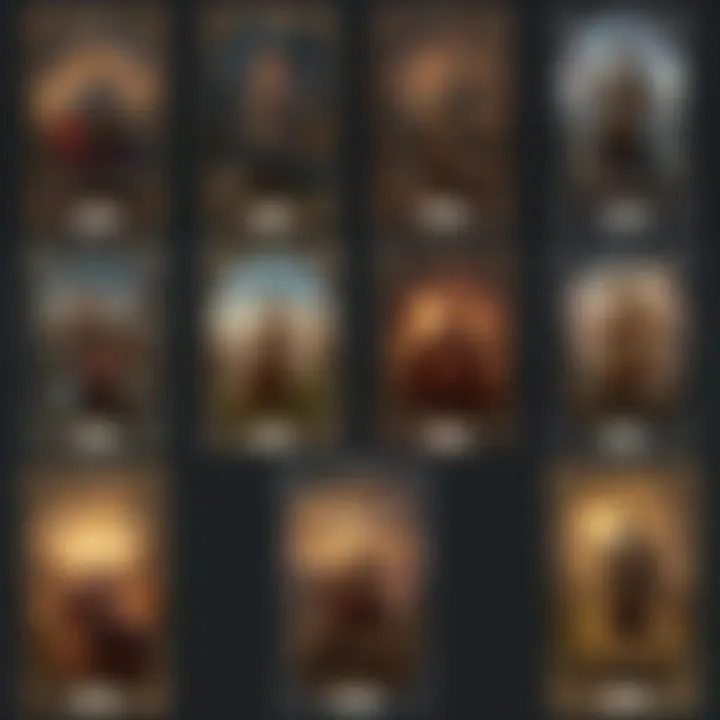Exploring Tarot Game Apps: Digital Divination Revolution


Intro
In recent years, tarot game applications have emerged as a significant trend in the realm of digital divination. The fusion of traditional tarot reading with modern technology creates a unique platform for spiritual exploration. These apps offer a variety of features that cater to both seasoned tarot enthusiasts and those newly curious about the practice. This article seeks to illuminate the evolution of tarot reading in the digital age, highlighting how these apps democratize access to spiritual insights and tools. As we navigate through the various functionalities and user engagement strategies, it is essential to consider the implications for users embarking on their spiritual journey through technology.
The rise of tarot game apps has revolutionized how individuals interact with tarot, making it not only accessible but also engaging. Despite the convenience of digital tools, users may encounter certain pitfalls that merit discussion. Balancing traditional practices with the digital medium will be a key focus of this exploration. Ultimately, our goal is to provide a comprehensive guide for those interested in tarot game applications and the distinct experiences they offer.
Zodiac Profiles
Tarot and astrology often intersect in fascinating ways. Understanding zodiac profiles helps users gain deeper insights into the energies influencing their lives. This section offers a structured overview of each astrological sign, exploring personality traits, strengths, and weaknesses.
Overview of Each Sign
- Aries: Born leaders, impulsive and energetic.
- Taurus: Practical and reliable with a love for comfort.
- Gemini: Adaptable, communicative, but often indecisive.
- Cancer: Nurturing and intuitive, yet sensitive.
- Leo: Confident and charismatic, can be self-centered.
- Virgo: Analytical and detail-oriented, may be overly critical.
- Libra: Social and fair-minded but can struggle with indecision.
- Scorpio: Passionate and resourceful, often secretive.
- Sagittarius: Adventurous and philosophical, sometimes tactless.
- Capricorn: Disciplined and responsible, but can be pessimistic.
- Aquarius: Innovative and independent, often detached.
- Pisces: Empathetic and artistic, may be overly emotional.
Personality Traits
Each sign is associated with distinct characteristics that shape individual behaviors. Understanding these traits can enhance tarot interpretations and personal insights. Participants can reflect on how their astrological profile influences their responses during tarot readings.
Strengths and Weaknesses
Recognizing both strengths and weaknesses helps individuals harness their potential while addressing areas for growth. For instance, an Aries' courage can be a strength, whereas impulsivity may lead to recklessness. The balance between these dual aspects opens doors to deeper self-awareness.
Compatibility Insights
Exploring compatibility through the lens of tarot and astrology provides insight into relationships and interactions. This section examines how different signs interact with each other, whether in love, friendship, or the workplace.
Love and Relationships
Astrology offers profound insights into romantic compatibility. For example, Fire signs often feel drawn to Air signs, as the latter can fan the flames of passion and creativity. Conversely, Earth signs appreciate the stability and reliability they find in fellow Earth or Water signs. Understanding these dynamics can enrich tarot readings focused on love.
Friendship Compatibility
Friendships also benefit from astrological insights. Signs that share elements may find it easier to connect. For instance, water signs tend to vibe well with others in their element, creating deep emotional bonds. Awareness of these compatibilities can guide individuals in nurturing meaningful friendships through tarot reflections.
Workplace Dynamics
Recognizing astrological compatibility can enhance workplace relationships. Some signs thrive in collaborative environments, while others prefer independence. Utilizing tarot can offer insights into workplace challenges and dynamics that arise between colleagues of differing signs.
Astrological Events
Astrology is often impacted by celestial events, influencing energies in profound ways. This section breaks down notable events and their implications, guiding individuals on how to prepare and harness these occurrences within tarot practices.
Monthly/Weekly Horoscope Breakdown
Regular horoscopes provide valuable insights into prevailing energies. Users can use tarot readings in conjunction with horoscopes to create a more holistic understanding of their circumstances.
Notable Celestial Events
Significant events, such as eclipses and retrogrades, can profoundly impact personal and collective energies. Understanding these can lead to impactful tarot insights.
How to Prepare for Astrological Shifts
Preparation is key when facing astrological shifts. Various tarot spreads can help individuals align with these energies, encouraging reflection and introspection to navigate changes effectively.
Foreword to Tarot Game Apps


The emergence of tarot game apps represents a significant intersection between tradition and technology. These tools serve not only as entertainment but also as a means for personal introspection and spiritual exploration. This article aims to dissect the key components, benefits, and considerations of these digital applications, providing a framework for understanding their role in modern divination practices.
Definition and Purpose
Tarot game apps are digital platforms designed to emulate traditional tarot reading. They typically allow users to draw cards, explore different spreads, and receive interpretations of their readings. The purpose of these apps extends beyond mere gameplay. They are intended to aid users in personal reflection, decision-making, and even healing. The convenience of having tarot at one’s fingertips makes it an appealing choice for many.
Unlike physical tarot decks, these apps can offer a plethora of features such as daily readings, customizable spreads, and various learning resources. Users might find it easier to engage with tarot through these interactive interfaces as they often include multimedia elements.
Historical Context of Tarot Reading
To understand the significance of tarot game apps, we must first look back at the history of tarot itself. The practice dates back to the 15th century, originating in Europe as playing cards. It later evolved into a tool for divination and self-discovery, notably gaining popularity in the 19th century.
Tarot reading is rooted in symbolism and archetypes. Each card tells a story and holds a lesson relevant to the individual's journey. This rich history sets the backdrop for the modern applications, which strive to maintain the essence of tarot while adapting to digital environments.
"Digital tools can enhance spiritual practices, but they require a balance between technology and tradition."
Digital tarot applications now bring this centuries-old practice to a wider audience. They make tarot more accessible, catering to those who may not have had the opportunity to learn from traditional sources. As a result, tarot reading has entered a new phase, marked by the fusion of age-old wisdom with contemporary technology.
The Rise of Mobile Apps in Spiritual Practices
The landscape of spiritual practices is undergoing a significant transformation with the rise of mobile apps, particularly in the domain of tarot reading. As people increasingly turn to technology for guidance and insight, these apps are changing how individuals engage with age-old spiritual practices. Understanding the implications of this shift sheds light on the relevance and potential of mobile tarot applications.
Digital Transformation of Traditional Practices
The integration of technology into traditional tarot reading offers both opportunities and challenges. Digital tarot apps provide users the ability to access tarot readings instantly, an experience that was once confined to physical interactions with a tarot reader. This shift enables deeper exploration into tarot fundamentals, allowing individuals to study cards at their own pace.
Powerful features, such as card interpretations, diverse spreads, and intuitive user interfaces, create an inviting space for users. This digital format promotes a greater understanding of tarot symbolism and meanings. Moreover, tarot game apps often introduce gamification elements to the reading process, making it more interactive. Users can participate in engaging scenarios that encourage a sense of discovery and learning, often absent from traditional settings.
This revolution is not without drawbacks. Over-dependence on screen-based readings can lead to diminished personal connection with the cards. In the physical realm, the energy between the reader and the querent plays a significant role. Digital experiences might lack this profound interaction, which some users value highly. However, bridging these gaps through thoughtful app design can enhance the user experience.
Accessibility and Reach
One cannot overlook the enhanced accessibility afforded by tarot game apps. Individuals from various social and cultural backgrounds now have the opportunity to explore tarot in ways that were previously restricted. Geographical limitations are mitigated, allowing users from all corners of the globe to access tools that enable personal insight.
Mobile apps democratize tarot reading as they make it available to anyone with internet access. This has led to an increase in users who might have once felt intimidated by traditional tarot readings or lacked access to knowledgeable practitioners. According to recent studies, the availability of diverse tarot resources has sparked interest among younger demographics, ensuring that the art of tarot continues to evolve.
In this vast ocean of digital content, community support features in apps foster connections among users. Individuals can share experiences, interpretations, and best practices within the app's forums or social media channels, creating a sense of belonging. For example, platforms like Facebook and Reddit provide avenues for users to engage with others who share similar interests. This has the potential to create lively discussions and broaden perspectives, enriching the learning experience.
Core Features of Tarot Game Apps
Tarot game apps bring the ancient practice of tarot into the digital age. These apps offer a wide range of features designed to enhance the user experience. The core features of these apps can fundamentally change how individuals engage with tarot. Understanding these features is crucial for anyone who wants to explore digital divination.
Card Spreads and Interpretations
One of the most important features available in tarot game apps is the variety of card spreads and their interpretations. Users can choose from traditional spreads like the Celtic Cross or more modern ones tailored to specific questions. This variety allows for flexibility in readings.
The interpretation of the cards is also critical. Many apps offer rich descriptions and meanings for each card. By leveraging databases of interpretations, users gain access to a wealth of knowledge. This can aid both beginners and experienced readers alike by providing various perspectives on the same card.
Moreover, some apps even incorporate artificial intelligence to suggest interpretations based on the user's past readings. This feature not only personalizes the experience but makes readings more insightful.
Personalization Options
Personalization plays a significant role in enhancing user satisfaction with tarot game apps. This can include customizing layouts and themes, allowing users to choose visuals that resonate personally with their spiritual journey. Many apps now offer the ability to select tarot decks, letting users pick from both traditional and unique artistic interpretations.
Aside from visuals, users can also set preferences for reading styles. For instance, some may prefer intuitive interpretations over analytical ones. Customization can also extend to notifications, enabling users to receive reminders for daily readings or special tarot events.
Educational Resources and Tutorials


Another essential feature of tarot game apps is the availability of educational resources and tutorials. This aspect is crucial, especially for those who are new to tarot or want to deepen their understanding of the practice. Many successful apps offer guided tutorials that not only explain how to use the app but also delve deeper into tarot theory and practice.
Users can access articles, videos, and community forums directly from the app. This accessibility fosters a greater sense of community among users. By sharing experiences and learning together, they can enhance their skills and insights.
In summary, the core features of tarot game apps serve as vital tools for both beginners and seasoned practitioners. They enhance the tarot reading experience by providing various card spreads, customization options, and educational resources.
User Engagement and Community Features
User engagement and community features are vital elements of tarot game apps. They enhance the overall experience, transforming the app from a solitary tool into a vibrant community space. These features not only facilitate interaction among users but also create a supportive environment focused on shared interests in tarot and spiritual growth.
Social Sharing and Community Support
Social sharing capabilities are integral to the success of any tarot game app. They enable users to showcase their readings, insights, and experiences on various platforms such as Facebook, Instagram, and Reddit. Sharing these experiences fosters community interaction and feedback, making the practice of tarot more dynamic and relatable.
- Creating Connections: Users can connect with like-minded individuals who share similar interests in tarot. This connection can lead to forming deeper relationships and collaborative reading sessions.
- Feedback and Insight: By sharing readings or interpretations, users can receive constructive feedback. This exchange of ideas enriches the learning process.
- Inspiration and Motivation: Engaging with community members can inspire users to explore different spreads or interpretations that they might not have considered otherwise.
Ultimately, the social sharing aspect enhances personal investment in the tarot process, deepening users' connections to their readings and fostering a sense of belonging.
In-app Challenges and Events
In-app challenges and events are another layer of engagement in tarot game apps. These features motivate users by introducing gamified elements into the experience. Events may range from daily card draws to thematic challenges related to specific tarot cards or spreads.
- Personal Growth: Challenges often encourage users to reflect on their readings and integrate learnings into their daily lives. For example, a challenge might ask users to draw a card on a specific topic and journal about their feelings and insights.
- Community Participation: Events create opportunities for collective participation. Users can join in challenges or contests that may include sharing their outcomes with the community, thereby enhancing interaction.
- Learning Opportunities: Participating in these events allows users to deepen their understanding of tarot. They may learn new techniques or perspectives by observing how others approach similar challenges.
The focus on community and shared experiences is what makes tarot game apps distinctive. They merge a solitary practice with social connectivity, creating a holistic spiritual experience.
In summary, user engagement features in tarot game apps are essential for building a sense of community. By integrating social sharing and hosting challenges, these apps not only facilitate personal exploration but also foster a supportive network of tarot enthusiasts.
Benefits of Using Tarot Game Apps
Using tarot game apps allows users to explore their spiritual journeys in a convenient and modern way. These applications not only offer accessibility but also transform the way tarot reading is perceived. By examining the benefits, we can appreciate how these tools complement traditional practices while providing unique advantages.
Convenience and Flexibility
One of the most significant benefits of tarot game apps is the convenience they offer. Users can access the apps anytime and anywhere. Whether it is during a lunch break or late at night, the ability to engage with tarot readings at one's own pace is invaluable. With just a simple touch on a screen, users can draw cards, interpret meanings, and reflect on their insights. This flexibility encourages more frequent use and exploration, leading to a deeper understanding of one’s self.
Moreover, many tarot apps allow for customization. Users can choose different decks, layouts, and even themes that resonate with their personal styles. This level of personalization enhances the experience and aligns the digital tool more closely with individual preferences, fostering a connection that feels authentic.
Cost-Effectiveness
The economic aspect is another cornerstone of the benefits offered by tarot game apps. Traditional tarot readings can be costly, especially if one seeks guidance frequently. In contrast, many apps provide cost-effective solutions. Some of them are free, while others offer in-app purchases at affordable prices. This democratization of tarot reading makes it accessible to a broader audience.
Investing in an app often means gaining access to various features that in-person readings may not provide. For instance, users can find extensive libraries of interpretations and history regarding tarot cards and spreads. This resourcefulness is a substantial advantage for those who wish to learn without the pressure of additional costs.
Engaging Learning Experience
Lastly, tarot game apps can deliver an engaging learning experience. Many applications come equipped with tutorials, guides, and interactive elements that facilitate understanding. Users can learn the symbolism of each card and the significance of their placements through quizzes or challenges, which adds a gamified layer to the experience.
In-app communities often allow users to share their experiences and insights. This interaction promotes learning from peers as well as creating opportunities for networking among enthusiasts. The ability to engage with other likeminded individuals fosters a supportive environment conducive to personal growth.
In summary, tarot game apps blend convenience, affordability, and educational resources, making tarot more accessible than ever before.
Overall, the benefits of using tarot game apps are clear. They are reshaping how enthusiasts approach their divination practices, blending traditional methods with modern technology to enhance spiritual exploration.
Challenges and Considerations


As tarot game apps continue to gain popularity, it is crucial to examine the challenges and considerations that accompany their use. These challenges have implications for how enthusiasts engage with this form of digital divination. Users must navigate between the convenience offered by these apps and the potential drawbacks that may arise. Understanding these issues is essential for ensuring a mindful approach to using technology in spiritual practices.
Over-Reliance on Technology
With the rise of tarot game apps, there is a danger of becoming overly reliant on technology. Many users may start to depend heavily on these applications for guidance, losing sight of the deeper connections made through traditional tarot reading. Relying on an app can lead to missed opportunities for personal reflection and intuition-based interpretation.
A few considerations here include:
- Loss of Personal Touch: The intimate nature of a tarot reading can diminish when conducted through an app. Users may find themselves engaging with generic interpretations rather than tailoring insights to their unique situations.
- Diminished Intuition: Relying on automated readings can inhibit the natural instincts that come with handling physical tarot cards. Users might overlook their own interpretations and feelings, which are critical in the tarot reading process.
- Technical Glitches: Apps can experience malfunctions, which may lead to incorrect readings or misunderstandings. This can discourage users and lead to frustration, undermining their spiritual practice.
To foster a balanced approach, users should consider integrating both traditional and digital methods of tarot reading. This hybrid approach may enhance their experience and prevent the pitfalls associated with over-reliance.
Authenticity and Interpretation Issues
Another important concern surrounding tarot game apps involves issues of authenticity and interpretation. While these tools offer quick access to readings, they can also reduce the richness of the experience.
Some key aspects to consider are:
- Generic Interpretations: Many apps rely on algorithms that provide standardized meanings for card draws. This can dilute the personal connection usually present in tarot, blurring the lines between nuanced readings and automated responses.
- Cultural Context: Tarot has a rich history and variety of interpretations across different cultures. Apps sometimes fail to capture this depth, presenting a one-size-fits-all approach that may not resonate with all users.
- User Misinterpretation: Without guidance from a knowledgeable reader, users may misinterpret apps' automated insights. This can lead to confusion and incorrect conclusions, thereby impacting decision making in significant ways.
The essence of tarot lies not only in the cards drawn but also in the context and the intuition of the reader.
Ultimately, while tarot game apps facilitate access to spiritual tools, they must be approached with critical thought. Users should prioritize finding a balance that embraces both technological convenience and the authentic experience of tarot reading.
The Future of Tarot Game Apps
Technological Advancements and Innovations
The future of tarot game applications is closely tied to the developments in technology. As mobile devices become more powerful and accessible, we expect tarot applications to leverage these capabilities in various ways. In particular, innovations in artificial intelligence and machine learning have the potential to enhance the user experience. For instance, apps can analyze user behaviors and preferences to generate customized tarot readings. This kind of personal touch can make the experience more engaging and relevant.
Furthermore, augmented reality (AR) is emerging as another exciting element. Imagine being able to visualize tarot cards in your physical space. Such an experience could deepen the connection users feel with the readings. Similarly, virtual reality could offer immersive experiences, where users can engage with mystical environments while exploring their tarot journey.
The integration of social networking features also plays a significant role. Users could share their readings easier with friends, fostering community and connection. Improvements in cybersecurity will be essential, too. As users engage more with these applications, protecting their data becomes paramount.
Potential Market Trends
The market for tarot game apps appears to be expanding steadily. Current trends indicate a growing acceptance of spiritual and wellness technologies. This shift indicates that more people are seeking guidance through digital means. In particular, millennials and Generation Z are becoming more interested in tarot reading, often using apps as their primary resource.
Key Market Trends:
- Increased Personalization: Users will demand more customized experiences. Apps that can offer personalized content and readings are likely to stand out.
- Subscription Models: Many apps may adopt subscription services to provide premium content and features. This could include exclusive readings, courses, or community access.
- Integration with Other Spiritual Practices: We may see the merging of tarot with other modalities like astrology or meditation. Apps that provide multifunctional tools could cater to a broader audience.
Overall, the future of tarot game apps is promising. As technology continues to evolve, these applications will likely play an integral role in modern spiritual practices, making tarot accessible, engaging, and tailored to individual needs. For users, this means a richer, more fulfilling journey into self-discovery through tarot.
The End
In summation, the exploration of tarot game apps signifies a pivotal shift in how individuals engage with spiritual practices. These applications have democratized access to tarot reading, allowing more people to explore their spiritual journeys unconstrained by physical or geographical limitations. This accessibility is paramount as it enables users to practice tarot in a format that is familiar to them — through their smartphones and tablets.
Summary of Key Insights
Several key insights emerge from our examination of tarot game apps. First, the core features of these apps — such as diverse card spreads, interpretation options, and educational resources — facilitate a personalized experience that can adapt to individual user needs. This personalization is significant in retaining users, as they can create a learning environment tailored to their preferences.
Secondly, the community features embedded within these apps promote social interaction among users. By utilizing social sharing capabilities and participating in in-app events, users can connect with like-minded individuals, enriching their tarot experience. This aspect of community is vital, as it not only enhances learning but also fosters a sense of belonging among users.
Finally, despite the numerous benefits, it is essential to acknowledge the challenges associated with over-reliance on digital tools. While tarot game apps offer convenience, users must maintain a balanced perspective on the essence of tarot reading and not allow technology to overshadow the traditional aspects of the practice.
Final Thoughts on Spiritual Technology Integration
As technology continues to evolve, it is crucial for practitioners and enthusiasts of tarot to consider its role within their spiritual practices. The integration of spiritual technology, such as tarot game apps, can enhance the depth and range of experiences available to users. However, it is imperative to approach this integration with mindfulness.
While reaping the benefits of convenience and community engagement, users should remain aware of the authenticity of their interactions with tarot. A thoughtful balance between utilizing digital tools and embracing traditional methods will ensure a rich and fulfilling spiritual journey.
In the end, tarot game apps are one piece of the larger puzzle surrounding spiritual practices. As users navigate this new terrain, they must constantly reflect on their intentions and the meaning behind their tarot practices.



